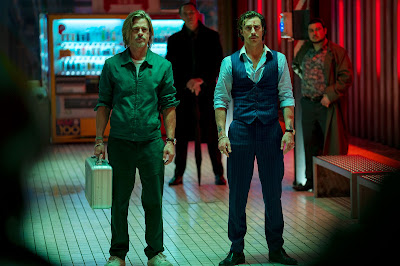Pitt plays a professional assassin codenamed Ladybug boarding the bullet train from Tokyo to Kyoto to retrieve a briefcase chock full of ransom money being carried by a pair of a different assassins, Tangerine (Aaron Taylor-Johnson) and Lemon (Brian Tyree Henry), transporting it along with the formerly kidnapped son of a menacing figure known only as The White Death. And that’s to say nothing of the myriad other bad actors aboard the train, from a British teenager (Joey King) to a Mexican executioner (Bad Bunny), all circling one another, in a manner of speaking, with their various motives. A lot of these motives are broadcast right up front. Indeed, if the title immediately puts one in the mind of mystery, a la “Murder on the Orient Express” and “The Lady Vanishes,” “Bullet Train” reads like an open book. The biggest mystery is the poisonous slithery, disgusting creature that has no business living amongst us slithering all over the train, forcing us (me) to wait to see when it will strike. The payoff, as it turns out, is more comic ellipsis, keeping in the film’s spirit. The briefcase, meanwhile, proves less MacGuffin than Deus Ex Machina, used to deflect bullets and, at a key point, as a distraction. There is no greater idea lingering in the air here. Like the eponymous vehicle itself, “Bullet Train” is just barreling straight ahead toward a rather obvious conclusion.
This is an action movie that, like most action movies these days, is a mixed bag. Best is a close quarter brawl between Ladybug and Lemon seated across from one another in the quiet car where their hand-to-hand combat is constantly interrupted by increasingly outraged “Shhhhhhs” from another passenger. It’s one of the few moments where “Bullet Train” seems aware of the surroundings, of the passengers, of what such hostilities might be like aboard a crowded train. Mostly, though, Leitch eschews the sense of the interiors, never mind the exteriors, going so far as to fashion a narrative excuse for all the passengers to be off the train as the movie nears its conclusion, unintentionally underlining how the train really is nothing more than a soundstage as opposed to a true physical space. And that is not even to cite is incuriosity with the Japanese environs. About the closest it gets is Ladybug fiddling with an opulent toilet, though even that is emblematic of how story seeds here generally fail to sprout with any vigor.
The give and take between quality and inconsequence extends to the characters and subsequently the actors playing them. I’m not sure if I’m forbidden by the arcane rules of criticism from spoiling who plays The White Death since he doesn’t show up until the end, but whatever…it’s Michael Shannon, ok? And “Bullet Train” never harnesses his unique energy in an interesting way, dialing it back if anything, his simple appearance in the first place the best part and sort of inadvertently illustrating how “They Came Together” (2014) understood best how to evince a cameo by Shannon, his presence too big for anything but ushering him stage right and then instantly right back off stage left. Zazie Beetz is deployed virtually like Keri Russell in “The Rise of Skywalker” – that is, hardly at all. Beetz is concealed, revealed, and gone. Tyree Henry and Taylor-Johnson fare better, cultivating a real chemistry even if Leitch virtually mocks their bromance through needle drops though the Tarantino-ish flashbacks to counting kills fail to emit the kind of cool that Taylor-Johnson does all on his own. Though his character gradually gets in too deep, Taylor-Johnson maintains an even temper even as his hair grows more unruly scene to scene, and his swagger…Lord, his literal swagger down the compact aisles of the train is so magnetic that another character literally comments on it.
Taylor-Johnson is more in traditional Movie Star mode than Pitt, evoked in the latter’s bucket hat and black frame glasses. Pitt has generally excelled better in character actor mode than Movie Star mode and here he sort of smuggles a character actor performance into the leading man’s part. His character is written in the vein of Martin Blank in “Grosse Point Blank,” a hitman trying to work on himself, as they say, calling a therapist who’s not really his therapist before and after hits. Ladybug has a therapist though he just talks about him, mostly to the woman (Sandra Bullock, marking the second movie of 2022 after “The Lost City“ in which we are essentially teased a Pitt/Bullock vehicle that never really comes to pass) on the other end of his phone line who becomes the sounding board for the various nuggets of therapy session wisdom he has accumulated. Pitt plays this in the register of an undergrad student who’s taken a couple philosophy courses and now thinks he’s got the keys to the universe. Dispensing this insight, often just to himself, while fighting and killing people, though, gives the sense that he really has emotionally moved beyond all the fighting and killing, and might be ready to literally move it beyond it to, levitating above the movie’s nihilism and improbably making this mostly hollow vehicle count for something.





No comments:
Post a Comment